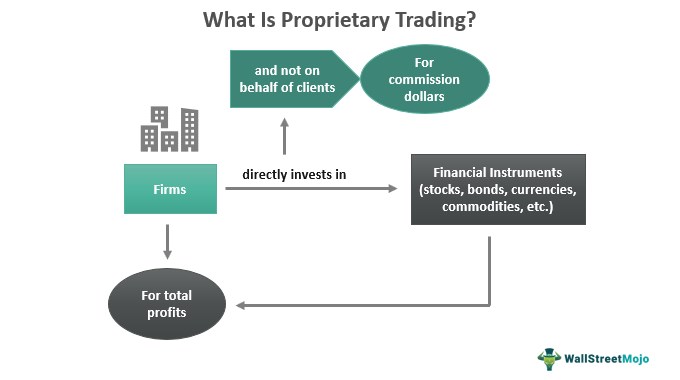Table Of Contents
What Is Proprietary Trading?
Proprietary trading is the process whereby firms directly invest in the financial instruments available in the market rather than doing it on behalf of the clients for commission dollars. In this type of trading, the companies investing directly in the financial market are eligible for total profits and not only a part of it.

Also referred to as prop trading, this technique allows firms to use their own money to invest and enjoy the full returns on the investment. However, in case of losses, the firms have no other party to share the liabilities with. In short, proprietary trading is a 100% win or 100% loss situation for the entities.
- Proprietary trading refers to the trading of financial instruments undertaken by banks or financial firms directly using their own money to earn profits for themselves instead of investing on behalf of the clients.
- When a financial institution or bank handles its client's account and trades on behalf of its clients, it earns only commission, which is just the handling fees and not a pretty big amount for a big entity like a bank.
- When the bank does it for its own sake and handles all its trading, it can keep the whole chunk of profits it would make from trading directly.
- The Volcker Rule is the law that guides prop trading firms and helps them work by the market requirements and under certain restrictions.
Many traders use Saxo Bank International to research and invest in stocks across different markets. Its features like SAXO Stocks offer access to a wide range of global equities for investors.
How Does Proprietary Trading Work?
Proprietary trading is opted for by those firms that wish to profit directly from the transactions or deals they invest in. When businesses invest in assets on behalf of their clients, they are subject to receiving a percentage of the client's profit. However, this is just a small part of the profit offered as a commission to them. On the contrary, working as a prop trader involves direct investment and direct profit for the firms. As a result, the full profit stays with them.
In this kind of trading, the firms/banks can stock the securities for future use, and at a later day, they can sell them to clients interested in buying them. As a result, the firms quickly become key players in the market and understand and gain access to valuable information that no investor can. Hence, a financial institution or bank can trade much more effectively than an investor ever could.
The bank has all the skill sets to handle the trading activity. Prop traders can use advanced and sophisticated technology and automated software, which the investors may not afford to use. In addition, they use multiple trading strategies to take effective trades and maximize profits. Volatility arbitrage, merger arbitrage, index arbitrage, and global macro trading are some techniques they consider for reaping more trade gains.
Regulation
The Volcker Rule regulates the proprietary trading market and is part of the Dodd-Frank Wall Street Reform and Consumer Protection Act. In the year 2008, the global economy crashed. The American economist and former United States Federal Reserve Chairman Paul Volcker opined that the global economic crash resulted from speculative investments done by investment banks. And as a result, he restricted the banks in the US from making certain types of speculative investments that were not meant for the benefit of their customers.
The rule came into effect in April 2014, and in response to it, many banks decided not to involve in proprietary trading or investing in assets. Moreover, the rule advocated how effective it would be to separate the basic banking functions from the trading activities the banks engage in. According to the Volcker Rule, the banks would remain more objective in offering customer services than gaining profits for themselves.
Though the rule intended to deliver better banking services to customers, it was observed as an unfavorable regulation. It was because the banks were found making the market more liquid for investors by implementing prop trading activities.
Examples
Let us consider the following examples to understand the proprietary trading meaning even better:
Example #1
Firm A started as a middleman and traded on behalf of clients. It invested in the stocks for clients and enjoyed the dollar commission as applicable on the trades. However, this commission was just a thin margin of the profits that clients made. The firm, therefore, decided to try prop trading and check how it performed.
It registered itself as a prop trading entity and started investing directly in the market. It enjoyed full profits without having to share it with any third party. This is how it entered the world of proprietary trading.
Example #2
The Trading Pit is the most suitable example to cite here, given its effective role in the financial market within a short period. Recently, it has secured approximately $10.4 million as growth funding and aims to take growth initiatives, becoming a global leader in prop trading. It is all set to accomplish its objectives by facilitating global access to different assets and acting as everything from a forex proprietary trading firm to cryptos prop trading company.
Risk
Though the benefits of prop trading are innumerable, it also has a con. While in the case of profits, these proprietary trading firms become the sole beneficiary, the same entities have to bear the adverse results in case of losses. This is because they are the sole operators; hence, no other entity is there to shoulder the burden of loss.
Proprietary Trading vs Hedge Fund
While discussing proprietary trading, there are lots of other terms that one comes across. One of them is hedge funds. Given the confusion that these terms create among traders, investors, and other participants in the industry, a few differences between them have been mentioned below:
| Category | Proprietary Trading | Hedge Fund |
|---|---|---|
| Ownership | Financial entities or banks | Fund managers appear to be the owner |
| Earning | Enjoys 100% profit | High commission charged |
| Risk | Fully liable | Limited |
| Access | More access to valuable information | Limited access to information |
For professional-grade stock and crypto charts, we recommend TradingView – one of the most trusted platforms among traders.
Disclosure: This article contains affiliate links. If you sign up through these links, we may earn a small commission at no extra cost to you.
Frequently Asked Questions (FAQs)
If a bank starts acting as a prop trading firm, it has a separate desk where it operates. On the other hand, if an entity starts from scratch, it must first ensure getting registered with the required authorities. For example, the firm has to get registered as a Limited Liability Company (LLC) or Limited Liability Partnership (LLP), etc. The next step is gaining market access through owner membership or broker accounts. Once the setup is prepared, the firm can start working as a prop trading firm.
A bank or financial institution can get into prop trading by having a separate trading desk, be it at a financial institution, investment bank, brokerage firm, etc. They need to register it and start investing in financial instruments using their own money to allow no share in the profit to anyone else.
Yes, prop trading is worth starting. This helps firms use their own money, invest it in financial instruments, and enjoy 100% profit without sharing it with any other party.
Recommended Articles
This article has been a guide to what is Proprietary Trading. Here, we explain the regulation it works on, examples, risks, and its differences with hedge funds. You may also have a look at the following articles to learn more –

